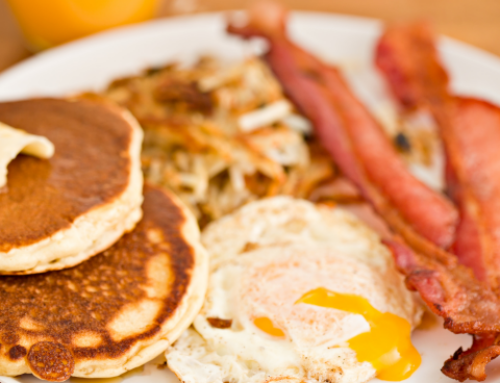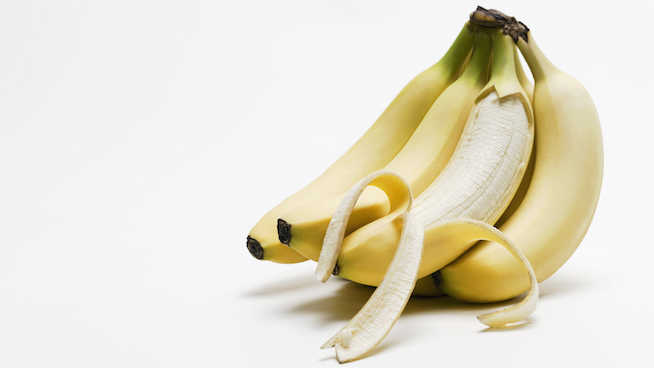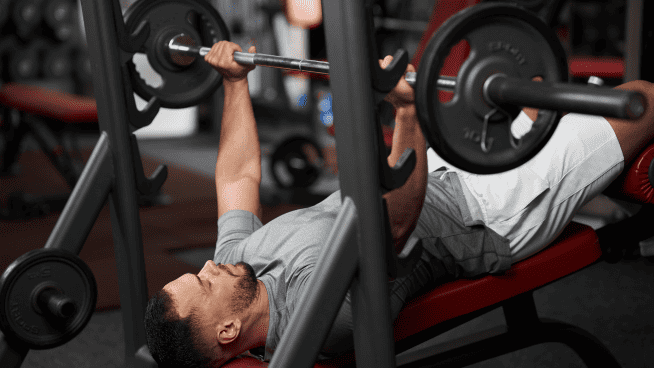Keeping weight on during football season is a struggle for many young players. You worked hard all off-season to bulk up and you felt great playing at your new weight, but now the number on the scale is dropping, and your play is suffering. With the hectic schedule of practices, workouts, games and classes, keeping your weight up can be difficult.
To make matters worse, the most crucial games come in October and November, and that’s when you want to be your biggest and strongest—but the long grind of the season may have already caused you to lose significant weight and muscle mass. But have no fear—STACK is here to help.
There are a number of simple tricks and methods you can use to increase the number of calories and protein you consume on a daily basis, which in turn will help you keep on weight and stay strong into the playoffs. Here are seven simple tricks for keeping weight on during football season.
1. Put Peanut Butter on (Almost) Everything
Peanut butter is the spread of the gods. It tastes amazing, it goes with everything and it’s easy to keep a jar handy almost anywhere. It’s also great for adding quality calories and protein to your diet if you’re looking to bulk up.
A two-tablespoon serving of peanut butter packs 188 calories and 8 grams of protein. It’s also high in healthy fats, which helps reduce joint inflammation and promotes muscle formation. “A peanut butter sandwich is a great protein and fat-dense food,” says Ryan Andrews, nutrition coach at Precision Nutrition.
RELATED: J. J. Watt Shows Why You Should Eat More Fat
You can eat peanut butter by the spoonful straight from the jar (just don’t let your Mom see you), but there’s an endless array of other ways to use it. Put it in sandwiches, spread it on a bagel, put it in shakes and smoothies, mix it with yogurt, pair it with fruit—don’t be afraid to get creative. The more ways you can find to work peanut butter into your diet, the better you’ll do in the battle to keep weight on.
2. Get your Egg On
Eggs are another food that is great for keeping on quality weight, since it provides a solid amount of calories and protein in a pretty small package. That means you can consume quite a few eggs before you start feeling full, which is exactly what you want when you’re trying to gain or keep on weight.
One egg served scrambled, fried or in an omelet packs about 90 calories and 6 grams of protein. Boiled and poached eggs contain slightly less, but are still solid choices.
RELATED: STACK Simple Cooking for Young Athletes: How to Cook Eggs
The simplest reason athletes lose weight during the season is a calorie deficit—they simply don’t eat enough to counteract the amount of calories they burn through activity. Thus, their bodies start burning fat and muscle for energy, which leads them to lose weight. If you play football, chances are you’re a fairly large athlete and you’re very active—which means a 2,000 calorie-a-day diet isn’t even remotely enough for you.
Like peanut butter, eggs are versatile. You can eat them plain, put them in an omelet, put them in a sandwich, mix them with rice, etc.
3. Embrace Carbs
Carbohydrates are the body’s major fuel source. “Carbs are the fuel of exercising muscle,” says Roberta Anding, Director of Sports Nutrition at the Houston Children’s Hospital and former dietician of the Houston Texans. If your body doesn’t have enough carbs, it starts using other things for fuel—like fat and even protein. If you’re looking to keep weight on, that’s not a good thing.
Simple carbs like fruits, potatoes, white rice, honey, jams and jellies give you a quick burst of energy, making them ideal for shortly before a workout or at halftime.
Complex carbs like brown rice, whole grains (breads, cereals, pastas), beans and lentils give you longer lasting energy, which makes them great choices for breakfast or a mid-afternoon snack.
You can combine multiple carb sources at meals to help you increase your calorie count and make sure you’ve got enough fuel in the tank to make it through the day.
4. Use Healthy Oils Liberally
Healthy oils like peanut, olive, grapeseed, avocado and coconut oil are excellent sources of calories and healthy fats. Like many of the foods previously mentioned, healthy oils pack a lot of calories into a small package.
One tablespoon of oil (no matter what variety) contains 120 calories. That means you can use it to easily add calories to your meals without having to do a lot of extra eating. Oils can be used with breads, sandwiches and salads; and cooking with healthy oils is a smart way to add extra calories.
When Anding was a dietitian for the Houston Texans, she created two buffet lines—one for players who needed to gain or keep weight on, and another for players trying to lose weight. The foods in the first line were prepared with more oil to increase their calorie count.
5. Go Nuts with Trail Mix
If you’re trying to keep your weight on, pick up a big jug of trail mix. The nuts in trail mix are high in calories and protein. Just a single ounce of peanuts packs 161 calories and 7 grams of protein. The numbers are similar for other popular trail mix nuts like cashews and almonds.
Dried fruit and a bit of dark chocolate are additional sources of calories and carbs that combine well with the nuts, making trail mix a fantastic food to help you keep weight on without feeling sluggish.
Keeping some trail mix in your locker is a good way to make sure you get enough calories throughout the day. “Trail mix is a great high-calorie, high-fat snack for in between classes,” Anding says. Grab a handful before practice, class or workout and you’ll be adding more calories to your diet with minimal effort.
RELATED: Homemade Trail Mix is the Perfect Grab-N-Go Snack
The same kinds of nuts you find in trail mix are excellent for adding calories to other dishes. Toss some almonds in your breakfast cereal, throw some peanuts in a stir fry or sprinkle some pecans in your salad to further kick up the calorie count.
6. Go All Out with Avocado
A single avocado contains 322 calories and a surprising 4 grams of protein. Thanks to their versatility and agreeable taste, avocados are good on a daily basis and pretty darn easy.
Sandwiches, salads, toast, eggs, pastas—avocados make everything better! And don’t forget guacamole. Like many of the foods on this list, avocados provide plenty of calories in a natural plant-based food. That means they’ll both help you keep good, muscular weight on and provide plenty of helpful antioxidants and compounds.
“You can have stuff like chicken fried steak with gravy sometimes, but you also need to promote your health outside of football. You don’t just want to put a ton of butter and cheese on everything,” Anding says. “There’s a big difference between an avocado and a pork rind.”
7. Drink Multiple Protein Shakes a Day
Protein shakes are popular for a reason—they’re a fast and efficient way to consume a significant amount of calories, protein and carbs. As such, protein shakes can be your best friend if you’re trying to keep on weight.
Drinking one with breakfast and before you go to bed is an easy way to consume more calories and protein every day without putting in a ton more effort. Studies have also found that drinking a protein shake before bed leads to increased strength and muscle mass. If you find yourself in a situation where eating a significant amount of food is inconvenient, just whip up a protein shake.
RELATED: Why You Should Drink a Protein Shake Before Bed
Protein shakes also make great accompaniments to meals, since it’s often easier to drink extra calories than to eat them. Meal replacement or instant breakfast drinks like Carnation or Ensure serve a similar purpose. If you can’t get any of those options on a regular basis for whatever reason, chocolate milk will get the job done.
RECOMMENDED FOR YOU
Keeping weight on during football season is a struggle for many young players. You worked hard all off-season to bulk up and you felt great playing at your new weight, but now the number on the scale is dropping, and your play is suffering. With the hectic schedule of practices, workouts, games and classes, keeping your weight up can be difficult.
To make matters worse, the most crucial games come in October and November, and that’s when you want to be your biggest and strongest—but the long grind of the season may have already caused you to lose significant weight and muscle mass. But have no fear—STACK is here to help.
There are a number of simple tricks and methods you can use to increase the number of calories and protein you consume on a daily basis, which in turn will help you keep on weight and stay strong into the playoffs. Here are seven simple tricks for keeping weight on during football season.
1. Put Peanut Butter on (Almost) Everything
Peanut butter is the spread of the gods. It tastes amazing, it goes with everything and it’s easy to keep a jar handy almost anywhere. It’s also great for adding quality calories and protein to your diet if you’re looking to bulk up.
A two-tablespoon serving of peanut butter packs 188 calories and 8 grams of protein. It’s also high in healthy fats, which helps reduce joint inflammation and promotes muscle formation. “A peanut butter sandwich is a great protein and fat-dense food,” says Ryan Andrews, nutrition coach at Precision Nutrition.
RELATED: J. J. Watt Shows Why You Should Eat More Fat
You can eat peanut butter by the spoonful straight from the jar (just don’t let your Mom see you), but there’s an endless array of other ways to use it. Put it in sandwiches, spread it on a bagel, put it in shakes and smoothies, mix it with yogurt, pair it with fruit—don’t be afraid to get creative. The more ways you can find to work peanut butter into your diet, the better you’ll do in the battle to keep weight on.
2. Get your Egg On
Eggs are another food that is great for keeping on quality weight, since it provides a solid amount of calories and protein in a pretty small package. That means you can consume quite a few eggs before you start feeling full, which is exactly what you want when you’re trying to gain or keep on weight.
One egg served scrambled, fried or in an omelet packs about 90 calories and 6 grams of protein. Boiled and poached eggs contain slightly less, but are still solid choices.
RELATED: STACK Simple Cooking for Young Athletes: How to Cook Eggs
The simplest reason athletes lose weight during the season is a calorie deficit—they simply don’t eat enough to counteract the amount of calories they burn through activity. Thus, their bodies start burning fat and muscle for energy, which leads them to lose weight. If you play football, chances are you’re a fairly large athlete and you’re very active—which means a 2,000 calorie-a-day diet isn’t even remotely enough for you.
Like peanut butter, eggs are versatile. You can eat them plain, put them in an omelet, put them in a sandwich, mix them with rice, etc.
3. Embrace Carbs
Carbohydrates are the body’s major fuel source. “Carbs are the fuel of exercising muscle,” says Roberta Anding, Director of Sports Nutrition at the Houston Children’s Hospital and former dietician of the Houston Texans. If your body doesn’t have enough carbs, it starts using other things for fuel—like fat and even protein. If you’re looking to keep weight on, that’s not a good thing.
Simple carbs like fruits, potatoes, white rice, honey, jams and jellies give you a quick burst of energy, making them ideal for shortly before a workout or at halftime.
Complex carbs like brown rice, whole grains (breads, cereals, pastas), beans and lentils give you longer lasting energy, which makes them great choices for breakfast or a mid-afternoon snack.
You can combine multiple carb sources at meals to help you increase your calorie count and make sure you’ve got enough fuel in the tank to make it through the day.
4. Use Healthy Oils Liberally
Healthy oils like peanut, olive, grapeseed, avocado and coconut oil are excellent sources of calories and healthy fats. Like many of the foods previously mentioned, healthy oils pack a lot of calories into a small package.
One tablespoon of oil (no matter what variety) contains 120 calories. That means you can use it to easily add calories to your meals without having to do a lot of extra eating. Oils can be used with breads, sandwiches and salads; and cooking with healthy oils is a smart way to add extra calories.
When Anding was a dietitian for the Houston Texans, she created two buffet lines—one for players who needed to gain or keep weight on, and another for players trying to lose weight. The foods in the first line were prepared with more oil to increase their calorie count.
5. Go Nuts with Trail Mix
If you’re trying to keep your weight on, pick up a big jug of trail mix. The nuts in trail mix are high in calories and protein. Just a single ounce of peanuts packs 161 calories and 7 grams of protein. The numbers are similar for other popular trail mix nuts like cashews and almonds.
Dried fruit and a bit of dark chocolate are additional sources of calories and carbs that combine well with the nuts, making trail mix a fantastic food to help you keep weight on without feeling sluggish.
Keeping some trail mix in your locker is a good way to make sure you get enough calories throughout the day. “Trail mix is a great high-calorie, high-fat snack for in between classes,” Anding says. Grab a handful before practice, class or workout and you’ll be adding more calories to your diet with minimal effort.
RELATED: Homemade Trail Mix is the Perfect Grab-N-Go Snack
The same kinds of nuts you find in trail mix are excellent for adding calories to other dishes. Toss some almonds in your breakfast cereal, throw some peanuts in a stir fry or sprinkle some pecans in your salad to further kick up the calorie count.
6. Go All Out with Avocado
A single avocado contains 322 calories and a surprising 4 grams of protein. Thanks to their versatility and agreeable taste, avocados are good on a daily basis and pretty darn easy.
Sandwiches, salads, toast, eggs, pastas—avocados make everything better! And don’t forget guacamole. Like many of the foods on this list, avocados provide plenty of calories in a natural plant-based food. That means they’ll both help you keep good, muscular weight on and provide plenty of helpful antioxidants and compounds.
“You can have stuff like chicken fried steak with gravy sometimes, but you also need to promote your health outside of football. You don’t just want to put a ton of butter and cheese on everything,” Anding says. “There’s a big difference between an avocado and a pork rind.”
7. Drink Multiple Protein Shakes a Day
Protein shakes are popular for a reason—they’re a fast and efficient way to consume a significant amount of calories, protein and carbs. As such, protein shakes can be your best friend if you’re trying to keep on weight.
Drinking one with breakfast and before you go to bed is an easy way to consume more calories and protein every day without putting in a ton more effort. Studies have also found that drinking a protein shake before bed leads to increased strength and muscle mass. If you find yourself in a situation where eating a significant amount of food is inconvenient, just whip up a protein shake.
RELATED: Why You Should Drink a Protein Shake Before Bed
Protein shakes also make great accompaniments to meals, since it’s often easier to drink extra calories than to eat them. Meal replacement or instant breakfast drinks like Carnation or Ensure serve a similar purpose. If you can’t get any of those options on a regular basis for whatever reason, chocolate milk will get the job done.

















